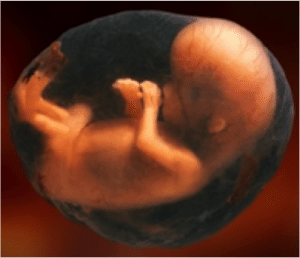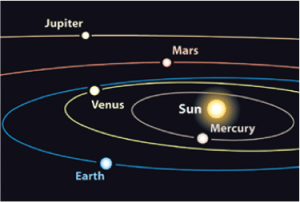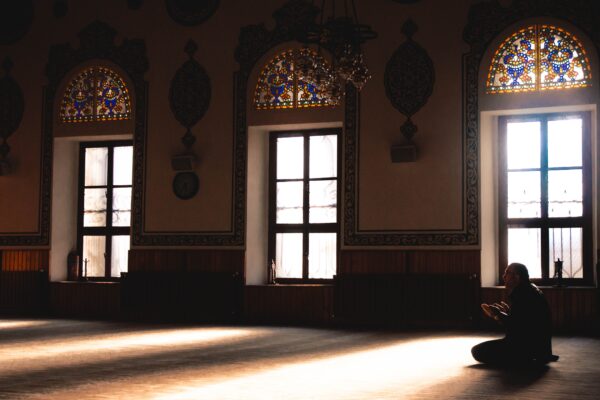From embryos to orbits and the layers of the atmosphere, the Quran, for centuries, has given us many scientific truths that have only recently been unveiled by scientists. This Quranic insight, and rediscovery by man in the modern day, demonstrates how Islam and science will always be intrinsically linked.
In the Quran, God calls our attention to the sky as being a “preserved and protected roof” (21:32) that serves a crucial function for the continuity of life. Only in the past century have modern scientists understood and appreciated the importance of the ozone layer and atmosphere in filtering out harmful rays and protecting the earth from meteors, harmful cosmic rays and the freezing cold of outer space, all of which have the potential to wipe out human life. It is almost beyond human comprehension to understand a system at work above the earth that is so intricate and perfect that it protects against all external threats. Not only does this remind us of the endless power of God, but also demonstrates that what scientists have proven in recent years is what God has already informed people of in the Quran centuries ago.

Prior to the 20th century, there had been little work done with regards to the classification of human embryos, with the development of the foetus being a scientific mystery. The Quran states that God “creates humans in the wombs of (their) mothers, creation after creation, in a threefold darkness” (39:6). Indeed, scientists have since discovered that the process of prenatal development occurs in three stages: the germinal stage, the embryonic stage and the fetal stage. Whether or not you believe in the Quran being a religious text, therefore, it is truly impossible to dispute the hard facts about the origin of life that are within it.
The sense of superiority scientists feel they have when they claim no connection to a faith is perplexing. Why, I ask, is science not considered a belief? It is the belief in the physical, and what we can see and touch. There should be nothing wrong with believing in the Unseen as well as the physical, as to choose either faith or science is to limit your own perspective of the search for truth and meaning. This is especially true when it comes to Islam, a religion that motivates people to explore and discover. This, in turn, resulted in many of the greatest discoveries of all time that are invaluable to us today. It is no coincidence that Muslims were the first to discover and use vaccinations, anaesthesia, chemical distillation, antiseptics, drug chemotherapy and quarantines, as Islam places a heavy emphasis on education and knowledge, and bettering the world around us. Imam Ali (AS) instructs us to “work for this world as if you will live forever”, thus teaching us the importance of constantly seeking out improvement in all aspects of life. Determinations to advance in healthcare could also be down to the core of Islam, which is to always feel compassion and have a strong desire to help those in need to the best of our abilities.
Despite being an ancient religion, rich in history and culture, Islam perfectly complements the way we, as modern thinkers, live our lives. Unlike the other major religions, Islam is accommodating of the need to further explore human development and the treatment of disease. Islam is not a complicated religion; the embryos being used in stem cell research would not survive if placed in a womb so neither the acts of murder or aborting a foetus are taking place in the name of science. Similarly, Islam fully permits the usage of birth control and IVF, which further reinforces the idea that Islam is the perfect companion to modern day science, and the most accommodating religion for us in modern times.
Some disagree with the view of science and religion coexisting in perfect harmony. “The Quran is not a science textbook,” says Rana Dajani, a Jordanian molecular biologist. “It provides people with guidelines as to how they should live their lives.” What Dajani doesn’t seem to realize is that rather than viewing science as a separate entity to religion and faith, it is entirely possible to view it as a mechanism of God in order for humans to make sense of the complexities of life and our origin. Instead of believing that things just materialize into existence, it only makes sense for the intricacies of the creations in the world to have been crafted by a superior Creator. Many discoveries that could not have been made without the aid of modern technology had already been explicitly stated in the Quran over 1400 years ago, thus tying together the importance of religion with understanding the world around us.
The building blocks of Western society and how we view life are, fundamentally, the result of the toils of Muslims in history as well as what has already been declared in the Quran before scientists made the same discoveries. Whilst Europe was stumbling through the Dark Ages,

Muslims had built the first universities, schools and hospitals, proving that Islam has always been at the forefront of scientific and intellectual development. From the Quran confirming that humans are born from a “clot of congealed blood” (96:1) to understanding that the celestial bodies “float in their orbit” (21:33), I find it difficult to comprehend how anyone could ever think that that religion hinders the ability for science to prosper, when it actually enforces the understanding of scientific discovery. Whether or not one believes in the Quran as a religious text, the verses in it lead us to recognise that science and religion most certainly act in synonymy, and always will.





